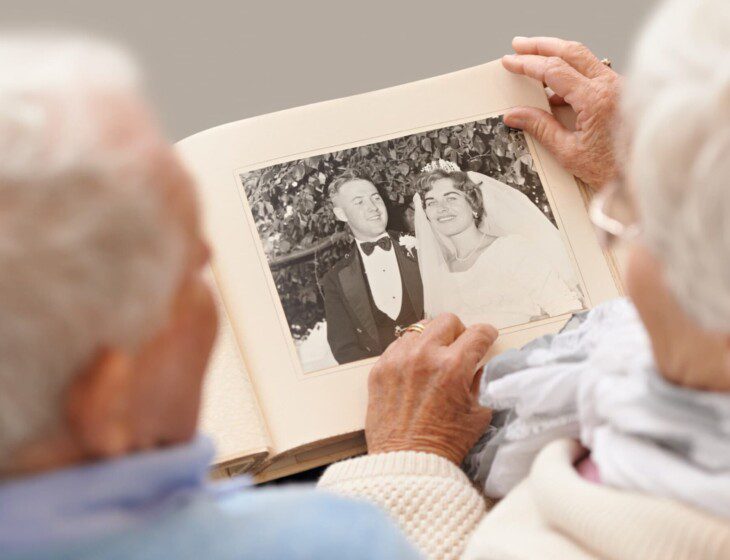At best, memory issues can be frustrating. At worst, memory issues can be a sign of Alzheimer’s or dementia. But how can you tell the difference between normal age-related forgetfulness and more troubling memory loss? And how can you support someone who is experiencing memory difficulties? We discuss both below.
Signs & symptoms of Alzheimer’s
Occasional forgetfulness can be a normal part of aging. After all, our skin certainly doesn’t act the same in our 70s as in our 20s, and neither does our brain. But just because it can be normal doesn’t make it any less concerning, especially when we know that signs of Alzheimer’s can begin to show up after age 60. Age-related forgetfulness, like forgetting to pay a bill, is typically followed by a later remembering. With Alzheimer’s and other dementias, that bill might not get paid for months on end and your loved one wouldn’t remember.
To help determine the difference between what is normal age-related behavior and what could indicate dementia, the Alzheimer’s Association outlines 10 early signs and symptoms to look out for. Of course, if you have concerns about the mental acuity of a loved one, talk with their doctor as soon as possible. While there is currently no cure for Alzheimer’s, early detection can lead to treatment options that lessen symptoms and it also allows you and your loved one more time to plan for the future.
How You Can Support Your Loved One
How you can best support your loved one will depend upon their symptoms and what stage of the disease they are in — early, middle or late. Different challenges come with each stage, but what remains constant is the value of your support.
Many individuals in the early stages of Alzheimer’s are able to remain quite independent, doing things like driving, working or volunteering. In the early stages, you can support your loved one by encouraging routines, providing memory cues and helping plan for the future.
The middle stage of Alzheimer’s tends to last the longest and includes additional memory loss and difficulty completing daily tasks like getting dressed or grooming. You can best support your loved one by encouraging their strengths, providing assistance with everyday activities and being patient and flexible as their routines change.
In the late stage of Alzheimers, cognitive and physical abilities decline drastically. Your loved one will likely require round-the-clock care and need assistance eating, moving and grooming. You can provide comfort and support to your loved one through reassuring touch, listening to music they enjoy or looking through old photos together.
As you care for someone with Alzheimer’s, it’s also important to take care of yourself to avoid caregiver burnout. Taking a few moments away to do something you enjoy, accepting help from others and joining a caregiver support group can all offer you a brief break and remind you that you are not alone.
Memory Care Options in Juno Beach
Different care options available to those living with Alzheimer’s that help provide the support they and their caregivers need, include adult day centers, in-home care services, respite care and residential care.
Adult day centers
Adult day centers offer engaging programming and socialization opportunities to those living with Alzheimer’s and memory loss. In addition to providing a break for caregivers, many adult day centers also have counseling or support groups available. The Community Resource Finder from the Alzheimer’s Association and the AARP can help you find options around Juno Beach.
In-home care
Hired care can help alleviate some of the burden on the primary caregiver. There are different kinds of in-home care providers you can hire to support your loved one in different ways: providing companionship, helping with housekeeping, assisting with personal care or providing skilled medical services.
Respite care
It’s true that respite care — care options that provide a break to the primary caregiver — can come in the form of adult day centers or hired providers, but the respite care we want to highlight is overnight respite care offered by many senior living communities. This type of care offers your loved one the same care services and benefits of full-time residents for a short period of time, from a few days up to a few weeks depending on the community.
Residential care
Residential care offers the benefits of community living while providing access to full-time care if needed. Some residential care communities might cater towards those in assisted living while others might specialize in memory care services. Others still might provide older adults with a full continuum of care. These continuing care retirement communities, or CCRCs, typically have independent living residences and advanced healthcare services all available within the community.
How The Waterford Can Support Your loved One
The Waterford is a CCRC in Juno Beach, Florida. Our Independent Living residents have access to skilled nursing or rehabilitation services should they ever need them. Providing our residents the keys to successful aging is at the core of everything we do. That includes providing services and support to residents living with Alzheimer’s and their caregivers. From our onsite support group and our memory-specific programming to our partnership with the Memory Centers of the Palm Beaches and our well checks on resident caregivers, we are committed to caring for the health and wellbeing of our residents.
Our team meets weekly to ensure we are taking care of our residents who might be showing signs of decline and providing them with the dignity they deserve. If you have concerns about a loved one in our community, we will work with you to come up with a plan to keep them safe while continuing providing our residents with the highest quality of life.
To learn more about the continuum of care offered at our community, please fill out the form below or call us at 561-627-3800.

